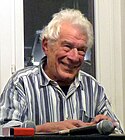John Berger Quote
Poems, even when narrative, do not resemble stories. All stories are about battles, of one kind or another, which end in victory or defeat. Everything moves towards the end, when the outcome will be known.Poems, regardless of any outcome, cross the battlefields, tending the wounded, listening to the wild monologues of the triumphant or the fearful. They bring a kind of peace. Not by anaesthesia or easy reassurance, but by recognition and the promise that what has been experienced cannot disappear as if it had never been. Yet the promise is not of a monument. (Who, still on a battlefield, wants monuments?) The promise is that language has acknowledged, has given shelter, to the experience which demanded, which cried out.
John Berger
Poems, even when narrative, do not resemble stories. All stories are about battles, of one kind or another, which end in victory or defeat. Everything moves towards the end, when the outcome will be known.Poems, regardless of any outcome, cross the battlefields, tending the wounded, listening to the wild monologues of the triumphant or the fearful. They bring a kind of peace. Not by anaesthesia or easy reassurance, but by recognition and the promise that what has been experienced cannot disappear as if it had never been. Yet the promise is not of a monument. (Who, still on a battlefield, wants monuments?) The promise is that language has acknowledged, has given shelter, to the experience which demanded, which cried out.
Related Quotes
Note, to-day, an instructive, curious spectacle and conflict. Science, (twin, in its fields, of Democracy in its)—Science, testing absolutely all thoughts, all works, has already burst well upon the w...
Walt Whitman
Tags:
conflict, credulous, curious, democracy, fable, fossil, glorious, instructive, literature, mythic
I get so god damn lonely and sad and filled with regrets some days. It overwhelms me as I’m sitting on the bus; watching the golden leaves from a window; a sudden burst of realisation in the middle of...
Charlotte Eriksson
Tags:
anxiety disorder, being happy, books, breath, breathing, bus, december, deep, depression, emotions
THE NEXT DAY WAS RAIN-SOAKED and smelled of thick sweet caramel, warm coconut and ginger. A nearby bakery fanned its daily offerings. A lapis lazuli sky was blanketed by gunmetal gray clouds as it wep...
Brandi L. Bates
Tags:
beauty, black authors, black history, deity, emotion, foodies, humor, inspiration, knowledge, literary fiction
About John Berger
John Peter Berger ( BUR-jər; 5 November 1926 – 2 January 2017) was an English art critic, novelist, painter and poet. His novel G. won the 1972 Booker Prize, and his essay on art criticism Ways of Seeing, written as an accompaniment to the BBC series of the same name, was influential. He lived in France for over fifty years.
